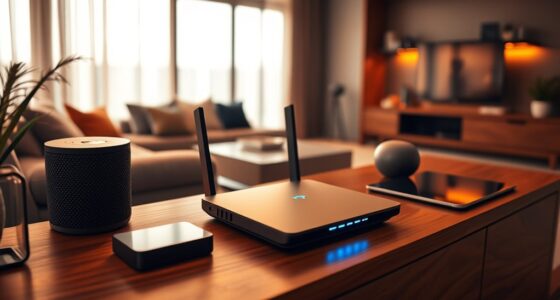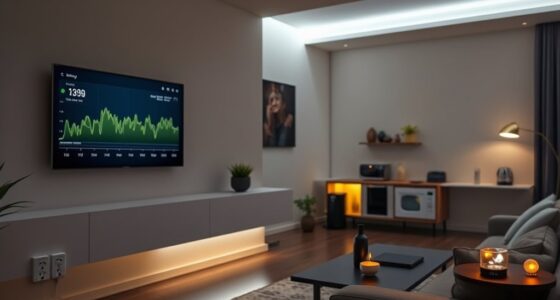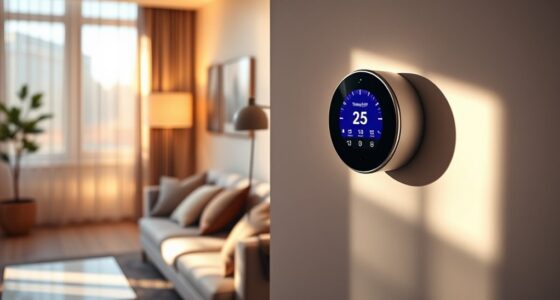Smart refrigerators offer cool tech like cameras, sensors, and voice control that promise convenience. But, they often come with high costs, complex maintenance, and security risks. Many features may not be worth the extra expense, especially if you’re on a budget or prefer simplicity. Connectivity issues and short lifespans can also impact long-term value. To find out if these high-tech fridges are right for you, explore the details ahead.
Key Takeaways
- Smart fridges offer advanced features like cameras and voice control but often come with high costs that may not justify their benefits.
- Connectivity issues and digital component failures can lead to maintenance challenges and reduce device lifespan.
- Many features, such as recipe suggestions and inventory tracking, provide limited practical value for average users.
- Privacy and security risks from data collection and hacking concerns can deter potential buyers.
- For most consumers, traditional refrigerators remain more cost-effective, reliable, and easier to maintain than smart models.
The Advanced Tech Inside Smart Fridges
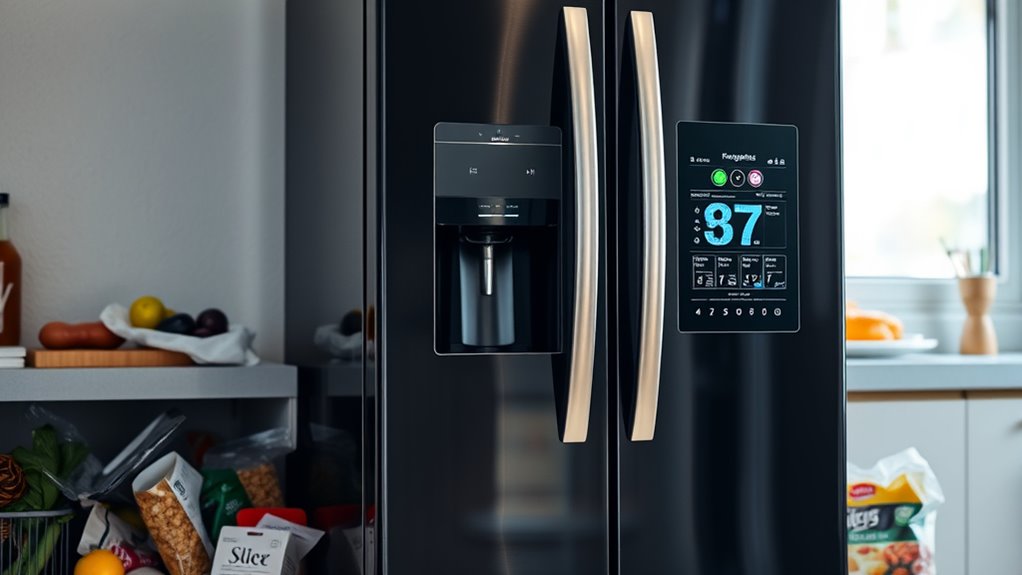
Have you ever wondered what makes smart refrigerators truly smart? It’s the advanced tech packed inside. Internal cameras and sensors keep tabs on your food, while Wi-Fi connectivity lets you monitor and control your fridge remotely. Machine learning algorithms recognize and track food items, automating inventory management and sending expiration alerts. You can easily adjust temperature control and customize adaptive zones to suit different foods. Built-in touchscreens act as control centers for settings, recipes, and media, while voice control via virtual assistants like Alexa or Google Assistant makes commands simple. Energy monitoring helps you optimize efficiency, and regular software updates keep your fridge running smoothly. Additionally, spoiled lemon juice detection technology can alert you to spoiled items, ensuring food safety and reducing waste. The integration of AI-powered features further enhances the overall convenience and functionality of your kitchen. Furthermore, smart appliance integration allows your refrigerator to coordinate with other smart devices, creating a seamlessly connected home environment. All these features work together to make your smart fridge more intuitive, efficient, and connected.
Weighing Benefits Against Practical Challenges
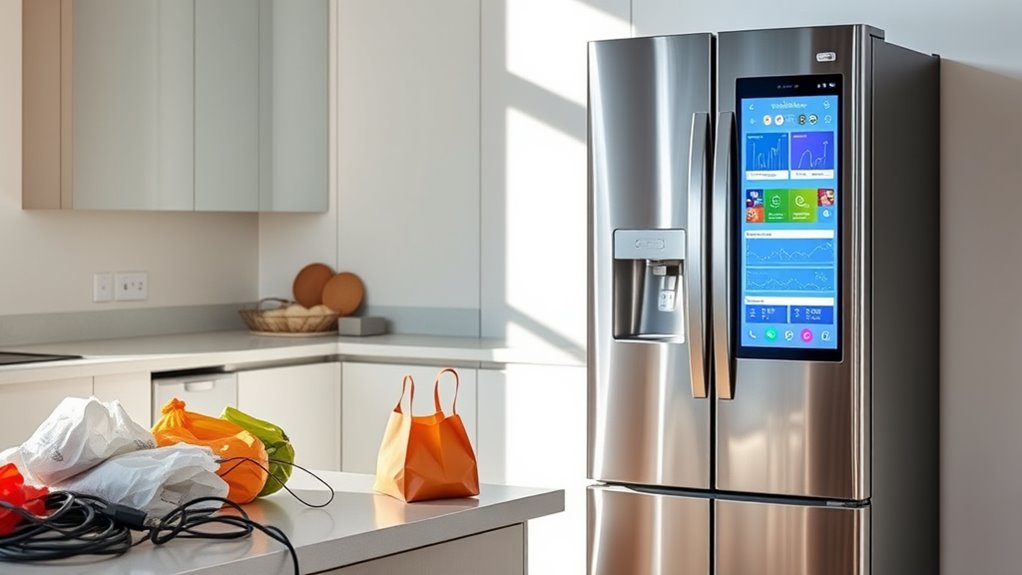
Smart refrigerators pack impressive features that can make life more convenient, from remote monitoring to personalized recipes. However, weighing these benefits against practical challenges is essential. The high cost and price often outweigh the advantages for many households, especially since the added complexity can make maintenance and repairs costly. Connectivity issues may limit performance during internet outages, and privacy concerns about data security are valid since these devices collect personal usage data. Consider whether the security measures are robust enough to protect your information. Additionally, some features may not justify the extra expense if your needs are simple. Think about whether the benefits truly enhance your daily routine or if the complexity and cost might outweigh the value. Incorporating smart technology into your appliance setup can introduce additional vulnerabilities if not properly secured. Being aware of user privacy concerns related to data collection is crucial when integrating these devices into your home. Understanding the cost and complexity involved can help you make a more informed decision about adopting such technology. Moreover, understanding how sound waves influence health and well-being could help you evaluate whether the benefits of advanced features align with your lifestyle. Recognizing the role of solar energy in powering smart appliances could also contribute to more sustainable choices.
Cost Analysis: Are Features Worth the Price?
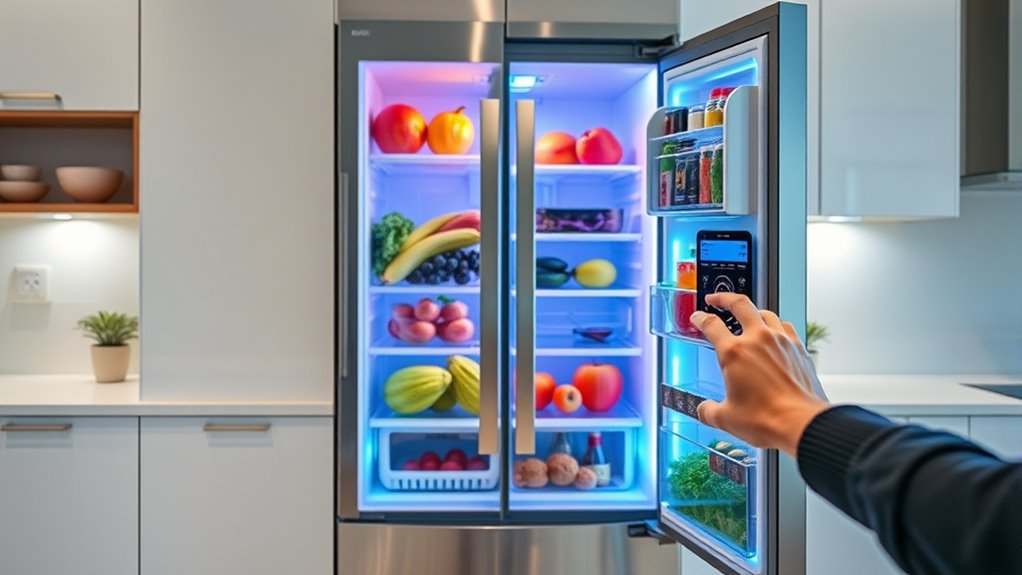
With prices often exceeding $3,000, a smart refrigerator can cost two to three times more than traditional models, making the cost analysis vital. You need to ask if the advanced features are worth the price. While features like internal cameras, Wi-Fi connectivity, and recipe suggestions add convenience, their practical value may be limited, especially considering the premium price. Energy efficiency can help offset the high upfront cost over time through lower utility bills, but the initial investment remains steep. Additionally, rapid technology obsolescence and repair costs can diminish the long-term value of your smart home integration. To determine if the features are worth the price, compare the added benefits against the higher upfront cost and consider whether they align with your needs and budget. Studies suggest that Vetted – The Pinball Spot indicates that some smart features may not significantly enhance everyday usability compared to traditional models. Furthermore, the complexity of installation and maintenance can be a deterrent for many consumers. Incorporating proper maintenance routines can help prolong the lifespan and functionality of your smart refrigerator, making the investment more worthwhile.
Maintenance, Security, and Lifespan Considerations
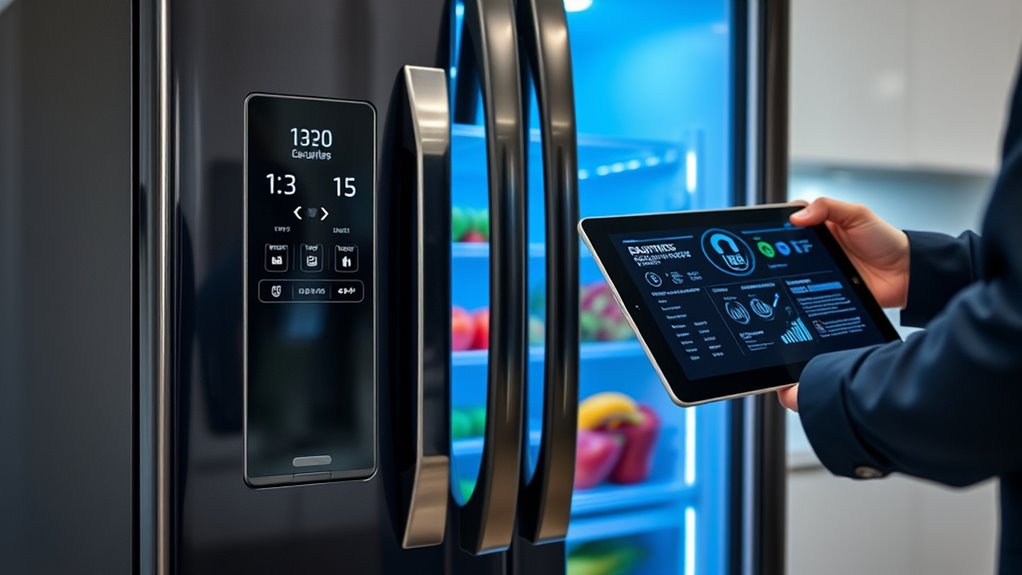
While the advanced features of smart refrigerators offer added convenience, they also introduce new challenges in maintenance, security, and lifespan. Digital components and sensors can fail, leading to costly repairs and increased troubleshooting. Software updates are essential for security and performance but require regular attention to avoid cybersecurity vulnerabilities. Connectivity outages may disrupt updates and diagnostics, affecting ongoing support. The lifespan of smart fridges often shortens due to digital obsolescence, typically lasting around 5-6 years before replacement. Maintenance challenges include identifying hardware malfunctions and managing digital parts that may need frequent repairs or upgrades. To keep your smart fridge reliable, you’ll need to stay vigilant about cybersecurity, plan for potential hardware issues, and understand that digital components may become outdated faster than traditional models. Additionally, digital component durability is crucial for creating a seamless user experience and ensuring ongoing compatibility with evolving technology standards.
Who Should and Should Not Invest in a Smart Refrigerator
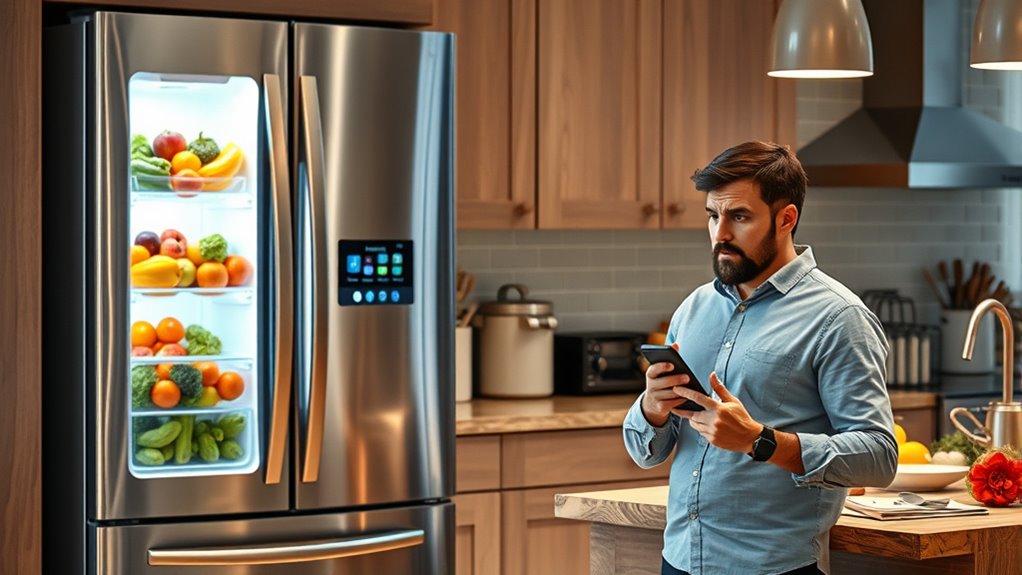
If you’re considering a smart refrigerator, it helps to evaluate whether its features align with your lifestyle and priorities. Tech enthusiasts and large families managing grocery inventories and meal planning will find value in smart appliances with advanced food management and inventory tracking. These models support home automation and energy savings, making them beneficial for energy-conscious users. However, if you’re budget-conscious or prefer simple, reliable appliances, traditional fridges may suit you better due to their lower cost and minimal complexity. Privacy concerns and security risks can deter those wary of data collection and connectivity. Minimalists or users rarely utilizing digital functions might see little benefit, as smart features may outweigh their consumer needs. Additionally, some users may be concerned about data privacy and security risks, which can impact their willingness to adopt connected devices. Moreover, given the rising prevalence of security zone info, integrating connected appliances could introduce new vulnerabilities. Awareness of personal data collection practices can help consumers make informed choices about device permissions and data sharing. Ultimately, your decision hinges on balancing the cost-benefit and your comfort with technology adoption.
Frequently Asked Questions
What Are the Disadvantages of a Smart Fridge?
You might find that smart fridges are quite expensive, often costing much more than traditional models, and their complex electronics can make repairs costly and tricky. If your Wi-Fi goes down, many features become useless, limiting practicality. Plus, there’s a privacy risk with data collection, and over time, software updates can make features obsolete, which could reduce the long-term value of your investment.
What Are the Capabilities of Smart Refrigerators?
Smart refrigerators offer a range of impressive capabilities that make your life easier. You can monitor and control them remotely via smartphone, receive alerts about expiring food, and get recipe suggestions based on what’s inside. They track inventory with internal cameras, recognize food items with AI, and integrate with your smart home system. These features help you save time, reduce waste, and stay connected, all while managing your household more efficiently.
What Are the Benefits of Samsung Smart Fridge?
You benefit from Samsung’s smart fridge by easily checking your groceries remotely with internal cameras and controlling settings via your phone. It helps you reduce waste with AI-powered expiration alerts and keeps your food organized. Plus, you can enjoy hands-free convenience with virtual assistants, stream your favorite music, and get software updates that keep your fridge running smoothly. All these features make daily life more efficient and enjoyable.
Which Refrigerator Design Is Most Efficient?
You might find it surprising, but the most efficient refrigerator design is often a French door model with multi-zone controls. It’s because these units precisely manage temperatures, reducing energy waste. Inverter compressors adapt to demand, saving power and extending lifespan. Compact models with adaptive cooling and optimized airflow also cut energy use. Look for Energy Star ratings; they balance advanced features with efficiency, helping you save money while keeping your food fresh.
Conclusion
Before you leap into the world of smart refrigerators, weigh their tempting features against the real-world hurdles. Think of them as a dazzling lighthouse—bright and alluring but sometimes a bit tricky to navigate. If you’re ready to embrace innovation without losing sight of practicality, a smart fridge can be a shining star in your kitchen. But if complexity feels overwhelming, it might be better to stick with the tried-and-true, ensuring your home remains a cozy harbor.


